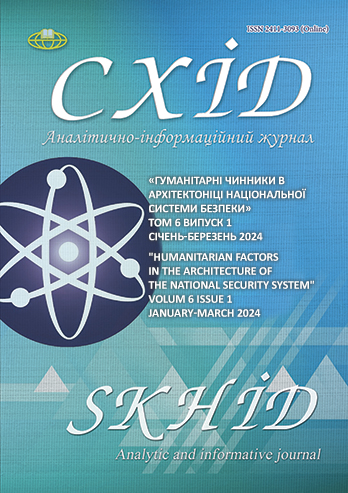Digital Consciousness and Identity
DOI:
https://doi.org/10.21847/2411-3093.2024.616Keywords:
digital consciousness, identity, artificial intelligence, digital personality, anthropomorphismAbstract
The aim of the study is to analyze how the development of digital consciousness and the widespread ingress of digital technologies into daily life affect the under-standing and formation of human identity in contemporary society. This aim encompasses several key research directions: studying the impact of virtual agents and artificial intelligence systems with elements of digital conscious-ness on individuals’ self- perception and their views of the world; identifying the role of digital media in the process of forming and rethinking social identity; analyzing the consequences of continuous interaction with digital technologies and content for personal development, self-esteem, and self-presentation; considering ethical and philosophical issues related to the creation and interaction with digital conscious-ness; reflecting on potential pathways for the development of relationships between humans and digital technologies, assessing opportunities and risks associated with a closer integration of artificial intelligence into the social and personal spheres of people’s lives. The result of exercising this interdisciplinary approach and combining various theories and observations show that people, with the help of technology, are taking part in developing their own identity, further proving the impact of digitalization on an individualistic and collective level; digital technologies also tend to have a profound and transformative impact on the peoples’ self-awareness and relations in a globalized world; furthermore, the use of digital technologies proves to be an effective means of global and subtle influence on the life, behavior and beliefs of modern people. It has been argued that postmodernism and cyberculture, in addition to having an ontological connection, share a model of world perception, which is not affiliated with any type of hierarchical model. The result of the author's reasoning is the conclusion that changes in technology or data loss are not mere technical problems – people end up feeling serious consequences of them, including drastic shifts in their personality, cognitive abilities and general well-being. This deeply affects the user’s ability to maintain their productivity, interact with information, and, more broadly, their ability to function in everyday life. Such situations highlight the need for the development and implementation of strategies and policies that consider potential vulnerabilities associated with technology dependence and aim to minimize the negative consequences of such dependence. Ethical considerations around cognitive extenders should include discussions on precautionary measures and development standards that ensure protection and support for users in the event of technological changes, updates, or failures. This might involve creating more resilient systems for data storage and recovery, developing more transparent and predictable update schemes, and introducing policies that support users’ cognitive autonomy and well-being.
Downloads
References
Airenti, G., Cruciani, M., Plebe, A. (eds.) (2019). The cognitive underpinnings of anthropomorphism. Frontiers Media SA, Lausanne.
Aycock, A. (1995). “Technologies of the self:” Foucault and internet discourse. Journal of Computer-Mediated Communication, 1 (2), September, https://doi.org/10.¬1111/j.1083-6101.1995.tb00328.x
Baker, R. (2013), Before Bioethics: A History of American Medical Ethics from the Colonial Period to the Bioethics Revolution. Oxford University Press.
Clarke, R. (1994). The Digital Persona and its Application to Data Surveillance. https://doi.org/10.1080/¬01972243.1994.9960160
Damiano, L., Dumouchel, P. (2018). Anthropomorphism in human-robot co-evolution. Frontiers in Psychology. 9, 468 (2018). https://doi.org/10.3389/fpsyg.2018.00468
Epley, N., Waytz, A., Cacioppo, J.T. (2007). On seeing human: a three-factor theory of anthropomorphism. Psychol. Rev. 114(4), 864-886. https://doi.org/10.1037/0033-295X.114.4.864
Hernández-Orallo J, Vold K. (2019). AI Extenders: The Ethical and Societal Implications of Humans Cognitively Extended by AI. AAAI /ACM Conference on Artificial Intelligence, Ethics, and Society (AIES 2018), Honolulu, Hawaii, USA. January 27-28, p. 507-513. https://doi.org/10.1145/3306618.3314238
Shvets, A. (2013). Modern model of narration: About the relation between cyberculture and postmodernism. (pp. 77-88). Part III. Narrative forms, cultural elements, L. Stansbie, A.M. Borlescu (Eds.), Reflections on Narrative Interdisciplinary storytelling, Interdisciplinary Press, Oxford.
Tsatsou, P. (2009). Reconceptualising “time” and “space” in the era of electronic media and communications, PLATFORM: Journal of Media and Communication, 1, 11-32 https://platformjmc.com/wp-content/uploads/-2015/04/platformvol1_tsatsou.pdf
Zuboff, S. (2020). The Age of Surveillance Capitalism: The Fight for a Human Nature at the New Frontier of Power, PublicAffairs.
Downloads
Published
How to Cite
Issue
Section
License
Copyright (c) 2024 Дахіль Велієв

This work is licensed under a Creative Commons Attribution-NonCommercial-NoDerivatives 4.0 International License.
1. Authors bear responsibility for the accuracy of facts, quotations, numbers and names used.
2. Manuscripts are not sent back.
3. The publisher does not always agree with the authors' opinion.
4. The authors reserve the right to authorship of the work and pass the first publication right of this work to the journal under the terms of a Creative Commons Attribution-NonCommercial-NoDerivatives 4.0 International License. This license allows others to distribute (copy) the published work for non-commercial purposes, provided there is mandatory attribution to its authors and a link to the first publication in our journal.
5. The authors have the right to conclude separate supplement agreements that relate to non-exclusive work distribution in the form in which it has been published by the journal (for example, to upload the work to the online storage of the journal or publish it as part of a monograph), provided that the reference to the first publication of the work in this journal is included.

